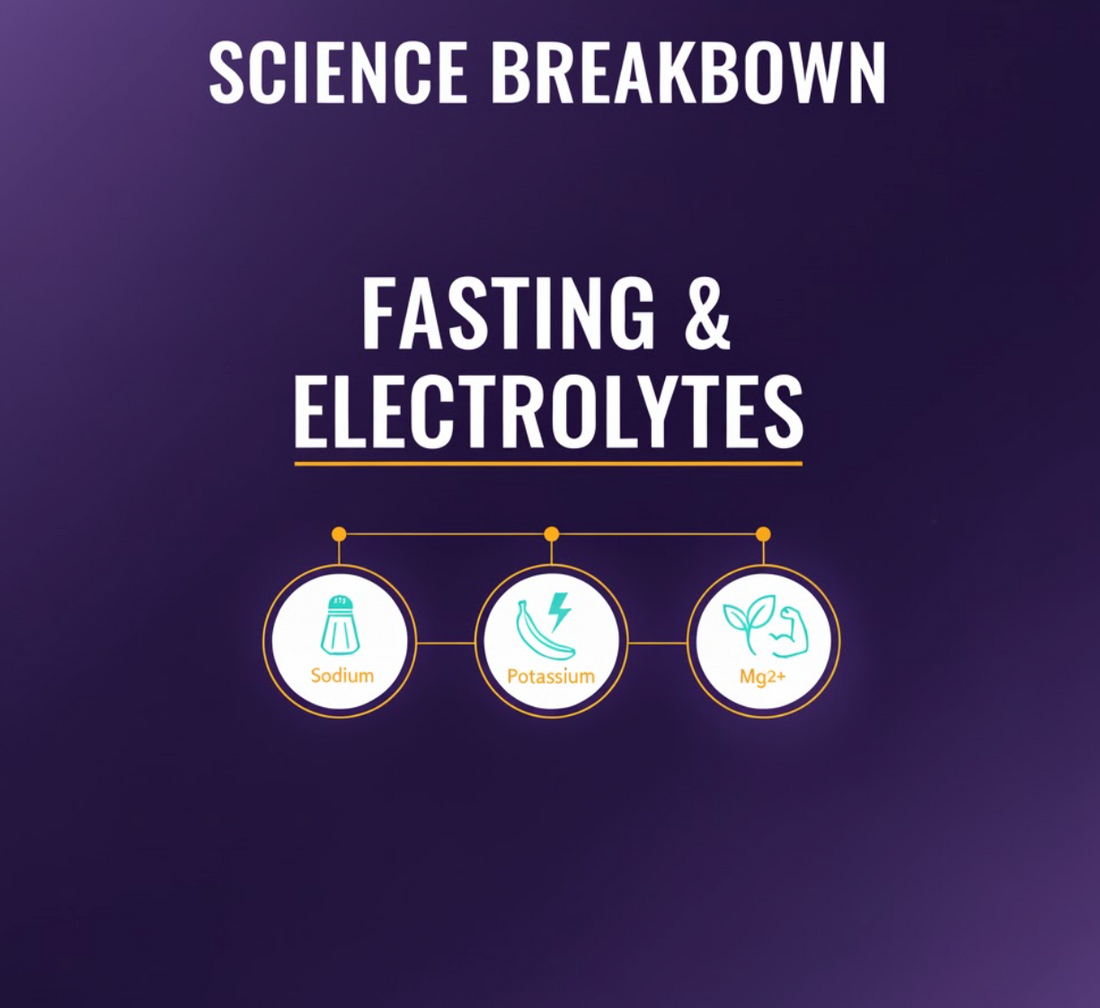Fasting is a powerful tool for metabolic health, weight management, and longevity. But if you’ve ever experienced the dreaded "keto flu", headaches, fatigue, or muscle cramps while fasting, you know it can come with side effects.
The common culprit? Electrolyte imbalance.
Understanding why your body’s mineral needs shift dramatically during a fast is the key to feeling great and making your fast sustainable. It all comes down to a fundamental change in your hormones and kidney function.
The Insulin Switch: Why You Start Flushing Minerals
When you eat, your body releases insulin to manage blood sugar. When you fast, your insulin levels naturally plummet. This drop is the metabolic magic that unlocks fat burning, but it also triggers a chain reaction in your kidneys.
Here’s the science breakdown of the connection between insulin and electrolytes:
- Insulin Drop: When insulin levels are low, it signals the kidneys to switch from retaining minerals to excreting them.
- Sodium Flush: The kidneys dramatically increase the excretion of sodium.
- Water Follows: Water is strongly tied to sodium. As your body flushes sodium, it also flushes vast amounts of water. This is why you lose several pounds of "water weight" quickly at the start of a fast.
- The Ripple Effect: When sodium is excreted, it creates an imbalance that also increases the excretion of other key minerals, primarily potassium and magnesium.
In short: Lower insulin means your kidneys become much less efficient at holding onto the minerals you need to survive. Your body is suddenly losing critical electrolytes at an accelerated rate.
The Essential Three: What Your Body Needs More Of
While many minerals are important, focusing on these three can solve 90% of fasting-related symptoms:
1. Sodium (Na+)
- Symptoms of Deficiency: Headaches, dizziness, fatigue, and the classic "keto flu" symptoms.
- Why You Need It: Sodium is essential for regulating blood volume, blood pressure, nerve function, and nutrient absorption. Because you are actively flushing it out, a lack of supplemental sodium is the primary cause of fasting malaise.
- Target Goal: Most fasters benefit from consuming 3,000–5,000 mg of sodium per day, often taken in small amounts throughout the day.
2. Potassium (K+)
- Symptoms of Deficiency: Heart palpitations, muscle twitches, muscle cramps (especially in the legs), and overall weakness.
- Why You Need It: Potassium works with sodium to regulate the balance of fluids in your cells and is critical for heart and muscle contractions. While you lose less potassium than sodium, the body's stores are smaller, making it easy to become deficient.
- Target Goal: Aim for 1,000–3,000 mg per day. Be cautious with supplements, as high doses of pure potassium can be overwhelming.
3. Magnesium (Mg²+)
- Symptoms of Deficiency: Difficulty sleeping, anxiety, muscle spasms, and constipation.
- Why You Need It: Magnesium is involved in over 300 enzyme systems that regulate protein synthesis, muscle and nerve function, blood glucose control, and energy production. It is a powerful supplement for improving sleep and reducing muscle tension while fasting.
- Target Goal: Aim for 300–500 mg per day, usually taken in a readily absorbable form like magnesium glycinate.
We have all 3 essential fasting electrolytes in our Fasting.Hydration.
How to Stay Balanced During Your Fast
You cannot rely on food to meet these needs, so strategic supplementation is critical.
- Mind Your Water: Don't just drink plain water—you'll dilute your remaining minerals even faster. Always add electrolytes to your water.
- Use High-Quality Supplements: Choose an electrolyte blend designed for fasting or low-carb lifestyles, ensuring it contains meaningful doses of all three key minerals (Sodium, Potassium, and Magnesium).
- Don't Wait for Symptoms: Headaches, fatigue, and cramps are signals that you are already deficient. Proactively take your electrolytes before you start to feel bad, beginning on day one of your fast.
By understanding the "Insulin Switch" and prioritizing the replenishment of the essential three electrolytes, you can transform your fasting experience from a struggle into a sustainable path toward better health.


